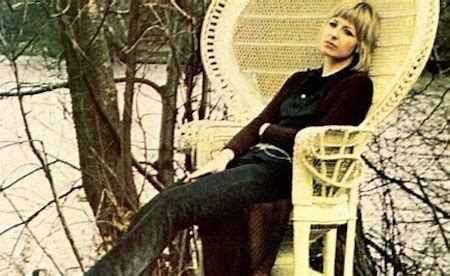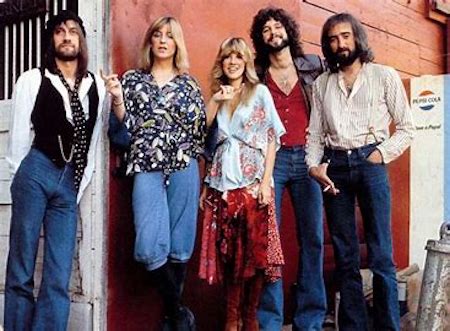
Christine McVie
Christine McVie
By Jay Luster
During the summer of 1975, Fleetwood Mac reintroduced themselves to the world with a romantic soft rock ballad called “Over My Head.” Penned and performed by keyboardist Christine McVie, it was the lead single released from the band’s 1975 second self-titled album, and the first Fleetwood Mac song to have received significant radio airplay in America. Because of the drastic change in sound, and its top 20 performance, it was forgivable that many of the kids buying records believed this was a brand-new band because it kind of was.
Following “Over My Head,” both “Rhiannon,” and “Say You Love Me,” charted higher in the US than anything the band had ever done before, and with songs like “Warm Ways,” “Landslide,” and “Monday Morning” also getting some airplay the album eventually elbowed its way to number one on the charts.
Because they had been around in one form or another since 1967, older fans already knew about Fleetwood Mac. Originally, they were a blues band formed by the extraordinary guitar player Peter Green. Prior to his departure in early 1970, they had made four records together, three of which went into the top ten on the British charts, but were barely known in America.
Two of those records listed a woman named Christine Perfect as a contributor on keyboards. Prior to this, Perfect (McVie’s maiden name) received some positive attention in Britain with the band Chicken Shack. In 1968, they recorded a song called, “Hey Baby,” and while credited to the whole band, it was mainly written by Perfect. Her sturdy vocal performance compares favorably with Dusty Springfield’s “Son Of A Preacher Man” which came out around the same time, and Etta James, “I’d Rather Go Blind,” with which Perfect scored a minor hit with on her debut solo album a couple of years later.

Chicken Shack had opened for Fleetwood Mac a number of times, and Peter Green had taken notice of the talented young woman. Beginning with their second album, Mr. Wonderful she became a regular studio contributor. Many years later, she joked that she was only interested in Fleetwood Mac because of her attraction to Peter Green; he was quite good looking. It was, however, bassist John McVie, who won her heart. After the couple married in August of 1968, she came to realize being in separate bands meant she would hardly ever see her new husband. She has said this was why she decided to leave Chicken Shack, and then eventually abandon her solo career in favor of Fleetwood Mac.
Peter Green’s version of Fleetwood Mac was originally a four piece. It featured two guitars, Green, and Jeremy Spencer, bassist John McVie, and Mick Fleetwood on drums. For their fourth release, the band went to Chess Records, in Chicago, and covered many songs by, and with the original artists. Shortly after that, Green left the band. He’d begun showing signs of the schizophrenia which would come to dominate his life, and it made his continued presence in the band untenable. They continued without him for an album, but then in 1971 asked Christine McVie to join them, followed shortly after by Bob Welch.
McVie’s first major writing and singing contribution was on the album Future Games, with the song, “Morning Rain.” Though it was never released as a single, or figured prominently in their live performances, it was nonetheless a strong debut and signaled a further shift away from their blues roots. While they didn’t score any hits in England, or the USA, during this era, they did receive some minor airplay with Welch’s “Sentimental Lady,” and McVie’s “Heroes Are Hard To Find,” from their 1974 album of the same name. However, with their core blues audience all but gone, and not really finding one as a soft rock band, Bob Welch left, and the future looked bleak.
While in Los Angeles, Mick Fleetwood heard Buckingham Nicks, and realized, despite having recorded with some of the best musicians in LA, they weren’t actually a band. They were a duo relying on hired guns for touring and in the studio. Fleetwood liked Buckingham’s guitar playing and was immediately intrigued by the potential. Here was a front line without a rhythm section, and he had a rhythm section without a front line. When they got together, Buckingham told Fleetwood he wouldn’t even consider joining them without his partner Stevie Nicks. John McVie thought it was a great idea, but the real question was whether Nicks and Christine McVie would get along.
Eventually when the five of them got together, it was apparent there would be no worries on that account. Both women have said they found their best friend that day, and through all the turmoil the band went through over the next 47 years, their bond never broke. That year the band released Fleetwood Mac, sometimes referred to as their white album, and after fifteen months of constant touring, and promotion, it reached number one in the USA.

Photo: Fleetwood Mac, creative commons
The following year, with a tailwind of success, flush with money, and fresh off of a victorious tour, Fleetwood Mac returned to the studio to record the follow up to their multi-platinum “debut” album. It was at this moment things began to fly apart in their personal lives. Mick Fleetwood, and his wife Jenny were going through divorce proceedings, as were John, and Christine, but it was Lindsey Buckingham, and Stevie Nicks’ often stormy relationship entering its melodramatic death throes that dominated the headlines.
While it would have been understandable had the band chosen this moment to disband, they really couldn’t. They had a record contract, and were obligated to get something on vinyl, which would be acceptable to the record company, but more importantly, to themselves. They turned all that pain, and passion into an album eventually called Rumours. To say it was a great album doesn’t quite do it justice. To date, it has sold in excess of 40 million copies making it currently the 8th bestselling album of all time, placing it on par with the Eagles’ Hotel California, and Pink Floyd’s Dark Side Of The Moon, and well ahead of anything by The Rolling Stones, Led Zeppelin, or Bruce Springsteen.
During its first year in release, every song from Rumours received some radio airplay, and at least four of them broke into the top ten. Two of them, “Don’t Stop,” and “You Make Loving Fun,” were written by Christine McVie. One of the gems on the record is McVie’s signature “Songbird.” She said it came to her whole, music and words, in the middle of the night like a dream. She woke up, went to her piano, and played it over and over to keep from forgetting it. While she claimed it wasn’t about anyone in particular, it is an expression of unconditional love, and Christine would play the song solo, on a grand piano to close out many of Fleetwood Mac’s live performances.

Photo: Christine McVie, Stevie Nicks, creative commons
Eventually, the constant touring, writing, and recording took its toll, and after three more albums, Tusk, Mirage, and Tango In The Night, each less successful than the one before it, the band’s line up began changing again. Lindsey Buckingham left, and one album later Stevie Nicks followed. Then, in 1998, quite unexpectedly, Christine McVie retired. She claimed she had grown road-weary, and so she moved back home to the UK to enjoy the life of a country gentlewoman.
Between Buckingham leaving the band in 1987, and McVie returning at the end of 2013, many incredible musicians, including Bekka Bramlett, and Dave Mason, came and went. However, once Nicks, and Buckingham rejoined Mick Fleetwood, and John McVie, they remained a four-member band until Christine, after her 15 year break, rejoined them. Later, she revealed she had developed a phobia of flying and had sought out help to get her through it. Her return restored the band’s most successful, and famous lineup, and together they performed more than 250 shows together.
Setting aside their tabloid selling interpersonal relationships, Fleetwood Mac’s most famous lineup was actually quite unusual. Even today it is almost unheard of for a rock band as successful as Fleetwood Mac, to have one woman, let alone two as talented and powerful as Stevie Nicks and Christine McVie. They were a mixture of both American and British artists which, up to that point, was also quite unusual. Finally, and possibly the most important feature is the presence of three incredible song writers. This is something they have in common with The Beatles. Again, it’s likely there are other bands who’ve had three, or possibly more members contribute songs, but Stevie Nicks, Lindsey Buckingham, and Christine McVie’s combined body of work have made Fleetwood Mac intergenerational headliners whose music is still in regular airplay all over the world, and Rumours has outsold any of the original Beatles albums, including Sgt. Peppers.
In 2018, after one of a thousand conflicts over the years, Fleetwood Mac fired Lindsey Buckingham, and with the recent passing of Christine McVie, it seems as if the band is probably done for good this time. While they have sometimes seemed to be as much soap opera, as rock band, Christine McVie’s steady presence, and versatility as a keyboard player, songwriter, and singer on a long list of beautiful love songs, was one of the main reasons the band remained on course even through its most turbulent headwinds. She was, in every wonderful way, their songbird, and her passing is a reminder that, while all good things may come to an end, having said I love you in a million different ways is the best legacy anyone can have.
Christine McVie online

I’ve seen Fleetwood Mac 5 times starting in 1977! They are my favorite band & I cried when the news of Christine McVies passing came out. Songbird was my wedding song. Thank you FM for the music that is the soundtrack of my life.
I love Fleetwood Mac from the bottom of my heart dreams rinnna everywhere rumor,s u make love fun love all of there songs
I am grateful for Fleetwood Mac and all of there changes they rocked me through my youth they had words that told stories which no one does these days..
The Rumors album came out when I divorced I survived on this album I connected with their losses. Top ten of all bands ever!!
I saw them in concert. Amazing how great they were. They stay in your minds Playlist. Bless you Christine.
If they just take buckingham back. We will all miss songbird. I loved her . She just had a way about her. So lovely so beautiful. If theres ever and angel Now shes is now. Miss u soo much
Didn’t even mention Danny Kirwan.
You’re right, I didn’t mention Kirwan. It wasn’t intended as a slight, but I was writing a farewell to the Songbird, not a bio of the band. I am fortunate, and grateful, Martine allows me to write such lengthy articles, but when you’re writing about a band associated with so many great musicians, with such a long and storied career, some things will inevitably be left out.
Other bands have had three songwriters but you’d have to look to Fleetwood Mac and the Beatles where all three were accepted by the public. Ultimately the public decides what they do and don’t want to pay for. Groups like Chicago became the Peter cetera show along with Michael McDonald and the doobie brothers. I’m sure I could think of others. Fleetwood Mac occupies a very unique space along with the Beatles in rock history